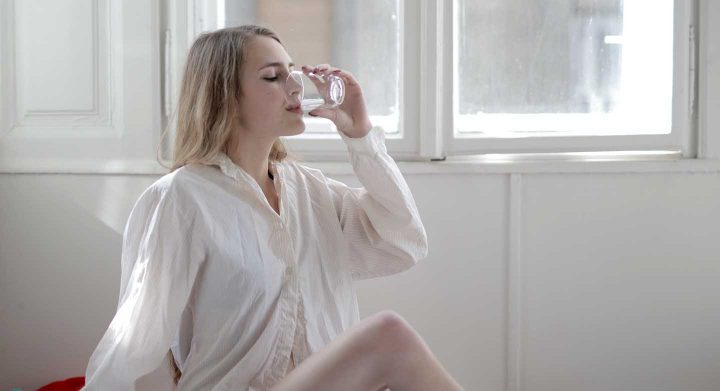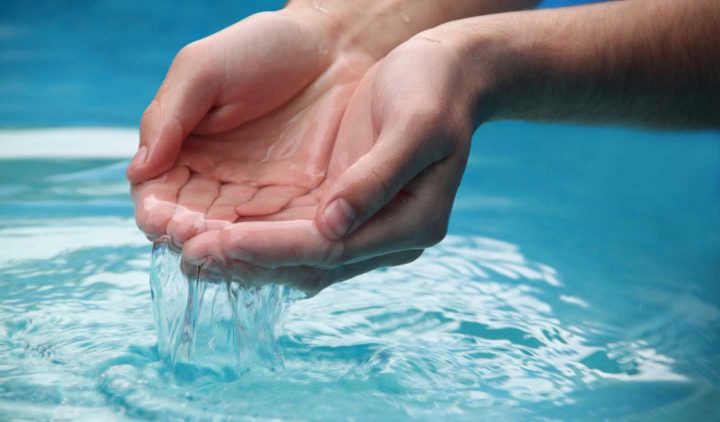Water – the cheapest medicine! A few years ago you could read this slogan on large posters in the streets of Vienna. Indeed, a lack of water can cause pain. If we drink a few glasses of water over our thirst, we feel noticeably better. Simply drinking water can resolve confusion. Anyone who has ever suffered from thirst in the desert knows what we’re talking about. Why is water so important?

Structure of Water
Water is a special liquid. Even his unusual chemical and physical properties make this small molecule to a great helper in the human ecosystem. We all know the chemical structure H2O. Two hydrogen atoms are connected to an oxygen atom at a very special angle so that two oppositely charged poles are formed. This dipole characteristic is the prerequisite for the special property of water. It can form hydrogen bonds with many other substances. In this way it can dissolve substances, bind, transport, excrete, yes life processes are made only possible by water. By the high specific heat capacity and latent heat released with the evaporation of the water, our body is protected from temperature fluctuations.
Water Balance
When nutrients are broken down, water is formed. Together with the hydration via drinks and food, it forms one side of the balance in relation to water absorption. The water loss occurs via the lungs, skin, kidneys and intestines. Consumption needs to be adequate to maintain a healthy balance. Drinking additional water beyond our thirst helps us to stimulate our body metabolism. Children naturally crave more drinks. Unfortunately, adults are less aware of thirst signals. Therefore, the water content in the cells decreases more and more with age. Chronic dehydration of the cells is the result, which can lead to symptoms like an illness. If the various signals of dehydration are not recognized, they are treated with medication. Hence the above saying makes sense: water – the cheapest medicine.
A good way to check that you are getting enough water is to check your urine. During the day it should be clear. That doesn’t apply to morning urine, it is more concentrated. The composition of the food also has an influence on the amount of water released. Increased salt and protein intake dramatically increases the amount of water excreted. Therefore, the cells also dry out when drinking seawater.
How Much Shall We Drink?
The body needs 6 to 8 glasses of water a quarter of a liter. Alcohol, coffee, black tea, diuretic teas and caffeine-containing beverages should not be included in the fluid balance. They stimulate the body to excrete more water. In coffee houses you get therefore a glass of water with a cup of coffee.
The first glasses of water should be drunk immediately after getting up. This stimulates the elimination of kidneys and intestines. The first glasses after getting up can be compared to washing the gastrointestinal tract. Ideally, water should be consumed between meals. Start drinking about two hours after meals, and stop drinking half an hour before the main meals. If more water is drunk, thirst is better recognized.

Plain tap water is best. Chlorine in tap water can evaporate when the water is poured into open jugs and left to stand. The hardness of the water does not matter. On the contrary; the calcium is good for our bones. Mineral water can also be used. But if it is used habitually, the analysis should be studied and water that is tailored to our health conditions should be preferred. In the case of high blood pressure, these are, for example, low-sodium mineral waters.
Fruit and vegetable juices will contribute to the water balance. But keep in mind that they will activate digestion. In small amounts they can be included with the meal. A vegetable juice is included best half an hour before lunch. If fruit juices are used between meals, they should be diluted because of the calorie content and because they stimulate the desire for sweet. And your main drink should always be water. It is simply the elixir of life.
Dangerous Water Loss
Humans are made up of around 70% water. Already 3% decrease in the total body fluid leads to a decrease in saliva production. 10% loss leads to confusion. Increasing the amount of drinking in nursing homes drastically reduces the confusion of residents. 20% of water loss is leading to death. Physical resistance and strength can also be increased by drinking appropriate amounts. For the expedition of Edmund Hillary, who was the first man who reached the summit of Mount Everest, drinking about 12 cups of water was crucial to their success.
Water as Medicine
Drinking too little water increases the risk of a heart attack. Drinking water makes the blood thinner and prevents it from clumping. High blood pressure is often a result of a lack of water. The vascular system of the whole body adapts to a reduced amount of blood by reducing its diameter. However, this means that the heart has to work more and some parts of the body will suffer from reduced blood flow.
Water can be very helpful for gastritis or inflammation of the duodenum. Mucous membranes that have enough water available act as an acid barrier. They are able to secrete more mucus then with lack of water. So drinking water is a natural protection against stomach acid.
Joint pain can also be a warning sign of a lack of water. The surface of the cartilage in a joint needs water to increase lubricity. In addition, when there is a lack of water, the blood supply and nutrient supply of the bone are reduced.
Many more illnesses, at least in the early stages, are probably related to a lack of water. We are definitely doing something good for our body when we drink water beyond our thirst.
Water of Life

Let us thank our Creator that we are allowed to live in countries where good drinking water is part of the quality of life and let us use it responsibly. Unfortunately, even in our part of the world, there are communities here and there where proper water supply are not always guaranteed.
Life is not possible without water. Water is so precious that in Christianity it is even compared to eternal life. In the fourth chapter of the Gospel of John, Jesus is talking to a Samaritan woman at Jacob’s well. She has to come to this well again and again to draw water. Everyone who drinks water gets thirsty again. Jesus offers the woman living water that flows into a source of eternal life. Jesus, the water of life, is just as necessary as the precious liquid that makes life possible. They belong together. Let’s keep this in mind when we have our next glass of cool water.

Esther Neumann studied Nutrition at the University of Vienna. Since then she served as an author for the health magazine “Leben und Gesundheit” and conducted health lectures in various locations of Austria.
In many cities of the world tap water is not safe. Even here in US it is common practice when traveling to use bottled water. Since you cannot obtain a real detailed analysis of most bottled water; it is best to use distilled water when traveling. Local people in their cities know more about their particular water quality at the moment. Here in WV cities like Charleston have had many chemical spills and temporary “do not drink orders” over the years.
Yes, when there is known pollution, you should avoid tap water, and when traveling it may be safer to go for bottled water. But if it is not mineral water, bottled water can be in many cases from the same source as tap water. So there are many who spend their money needlessly to buy the same quality water bottled up. And there are much more suffering from not drinking enough water then they are that are diseased from the pollutants in the water. In case of doubt, a good filter can often improve somewhat the water quality.
I practice dry fasting once a week (36 hours). It is supposed to be healthy but contradicts everything I have heard and read about the necessity to drink a lot of water. Any comment on this?
While a short fast from food can be very healthy, limiting water intake during the fast can be detrimental to our health. It can lead to dehydration, electrolyte imbalances, headaches and other complications. Drinking plenty of water during a fast is surely the healthier option.